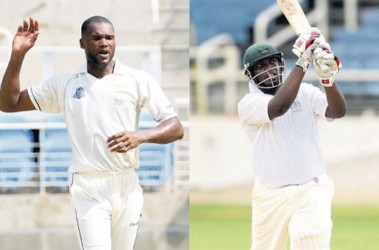(Jamaica Observer) The hierarchy of the Jamaica Franchise has thrown its support behind the inaugural professional system, which facilitates more regional players to be retained on contracts.
Bundled with the expanded contract structure is the revamped four-day tournament in the form of the franchise-based West Indies Cricket Board (WICB) Professional League.
Junior Bennett, the Jamaica Franchise head coach, was unequivocal in stressing that regional cricket will benefit from such an arrangement.
“I think it’s the way forward as it pertains to the cricket and I welcome it,” he told the Jamaica Observer.
Bennett said the individual ability of cricketers and ultimately the quality of regional cricket will improve once players are exposed to a sustained professional set-up.
In addition, he argued that players will be able to earn a living from playing the sport, and not be forced to balance their regular day-to-day jobs with both cricket training and matches.
“Being contracted simply means that you leave your home every day of the week to practise and you don’t have to think about going to [another] work; cricket will be your job. Presently what is happening is that you have to write letters to companies to release players to come to training and sometimes there is a problem. Players can just go out and train hard and such a player will definitely have a good chance to excel,” the veteran coach explained.

He said the feedback from regional cricketers, particularly young players and even senior players, who had had minimal or no experience in the senior West Indies set-up, has been positive.
“The players welcome it because it’s only a small percentage of players will go on to play West Indies cricket. There are players playing first class cricket for 10 to 15 years and have been struggling.”
The 33-year-old Jamaican David Bernard made his first-class debut in 2000-01 and has played three Test matches for the West Indies — the last one coming in 2009. He argued that the professional structure allows players “to put cricket in front of everything”.
“It seems a change for the best; having cricketers training in a system for a year and their performances determining if they’ll get a contract can only improve the game and improve the cricketers.
“It provides them the opportunity to put cricket in front of everything. Once you are good enough to be in the system then you’ll have a career and playing for the West Indies would not be the only way to earn. So if you are consistently good enough to be in a first-class setting for a period of time, then you’ll actually make a living out of it,” said the all-rounder.
Another veteran first-class player, Tamar Lambert, who has captained Jamaica throughout their most successful period in regional four-day cricket, was also in support of the Professional Cricket League (PCL) and the revamped retainer contract system.
“I think it will benefit everybody because people would take the cricket very seriously, especially the youngsters because not everybody will play for the West Indies. Earning a contract means you’ll have to work hard to maintain that contract. It’s something you don’t want to lose and at the end of the day it’s a lot of hard work.
“It may not all fall into place in the first year, but I think by the second and third year we’ll see West Indies cricket on the right track,” said the 33-year-old middle-order batsman.
The second round of matches concluded on Monday, but in the weeks leading up to the tournament’s start there was concern in some quarters that the PCL would suffer a false start due to a salary dispute involving elite players, the WICB, and the West Indies Players Association (WIPA) which represents regional cricketers.
The problem, which stemmed from recently signed agreements WICB and WIPA, led to an abrupt end to the recent tour of India.
The aggrieved players said the new arrangement resulted in a significant drop in player earnings, even while they declared their dissatisfaction with WIPA. The players then blamed the WICB for failing to intervene despite knowing of the issue between the regional team cricketers and WIPA.
In the meantime, WIPA responded that the current structure allows a wider group of regional players to gain a salary from cricket, particularly through the professional franchise system.
For their part, the regional board said that, according to the set guidelines, they could only bargain with the players through their union.
The WICB have since set up a task force to thrash out a solution to the impasse.








